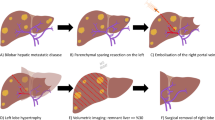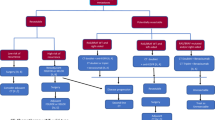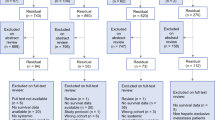Abstract
Study Aims
To determine if neoadjuvant FOLFOX/FOLFIRI is associated with improved disease-free survival (DFS) or overall survival (OS) in patients with colorectal metastases (CRM) to the liver.
Methods
Ninety-nine patients (from 457 eligible) with CRM that underwent hepatic resection during 2000 to 2005 were included. Group 1 (n = 44) patients received neoadjuvant FOLFOX/FOLFIRI, and Group 2 (n = 55) did not receive neoadjuvant therapy.
Results
There were 58% men. The median age for Group 1 was 58 and Group 2, 64 (p = 0.03). OS for Group 1 at 1, 3, and 5 years was 93%, 62%, and 51%, respectively, with a median OS of 5.8 years. In Group 2 survival at 1l, 3, and 5 years was 90%, 63%, and 45%, respectively, with a median OS of 3.7 years (HR 1.06, p = 0.87). The DFS for Group 1 at 1, 3, and 5 years was 51%, 20%, and 20%, with a median DFS of 1.1 years and Group 2 at 1, 3, and 5 years was 58%, 32%, and 32% (median DFS—1.2 years; HR = 1.24, p = 0.45).
Conclusions
Neoadjuvant FOLFOX/FOLFIRI was employed more frequently in younger patients with CRM; however, neoadjuvant chemotherapy for CRM was not significantly associated with an increase in OS or DFS, despite additional adjuvant therapy.




Similar content being viewed by others
References
SEER Cancer Statistics Review, 1975–2003, LAG Ries, et al., Editors. 2006, National Cancer Institute: Bethesda, MD, http://seer.cancer.gov/csr/1975_2003/, based on November 2005 SEER data submission, posted to the SEER web site. p. 1–25.
Lee JJ, Chu E. An update on treatment advances for the first-line therapy of metastatic colorectal cancer. Cancer J 2007;13:276–281.
Barone C, Nuzzo G, Cassano A, Basso M, Schinzari G, Giuliante F, D'Argento E, Trigila N, Astone A, Pozzo C. Final analysis of colorectal cancer patients treated with irinotecan and 5-fluorouracil plus folinic acid neoadjuvant chemotherapy for unresectable liver metastases. Br J Cancer 2007;97:1035–1039.
Fong Y, Fortner J, Sun RL, Brennan MF, Blumgart LH. Clinical score for predicting recurrence after hepatic resection for metastatic colorectal cancer: analysis of 1001 consecutive cases. Ann Surg 1999;230:309–318. discussion 318–321.
Bismuth H, Adam R, Levi F, Farabos C, Waechter F, Castaing D, Majno P, Engerran L. Resection of nonresectable liver metastases from colorectal cancer after neoadjuvant chemotherapy. Ann Surg 1996;224:509–520. discussion 520–522.
Fortner JG, Silva JS, Cox EB, Golbey RB, Gallowitz H, Maclean BJ. Multivariate analysis of a personal series of 247 patients with liver metastases from colorectal cancer. II. Treatment by intrahepatic chemotherapy. Ann Surg 1984;199:317–324.
Adson MA, van Heerden JA, Adson MH, Wagner JS, Ilstrup DM. Resection of hepatic metastases from colorectal cancer. Arch Surg 1984;119:647–651.
Scheele J, Altendorf-Hofmann A, Grube T, Hohenberger W, Stangl R, Schmidt K. Resection of colorectal liver metastases. What prognostic factors determine patient selection? Chirurg 2001;72:547–560.
Pawlik TM, Choti MA. Surgical therapy for colorectal metastases to the liver. J Gastrointest Surg 2007;11:1057–1077.
Fong Y, Cohen AM, Fortner JG, Enker WE, Turnbull AD, Coit DG, Marrero AM, Prasad M, Blumgart LH, Brennan MF. Liver resection for colorectal metastases. J Clin Oncol 1997;15:938–946.
Choti MA, Sitzmann JV, Tiburi MF, Sumetchotimetha W, Rangsin R, Schulick RD, Lillemoe KD, Yeo CJ, Cameron JL. Trends in long-term survival following liver resection for hepatic colorectal metastases. Ann Surg 2002;235:759–766.
Lubezky N, Geva R, Shmueli E, Nakache R, Klausner JM, Figer A, Ben-Haim M. Is there a survival benefit to neoadjuvant versus adjuvant chemotherapy, combined with surgery for resectable colorectal liver metastases? World J Surg 2009;33:1028–1034.
Adam R, Delvart V, Pascal G, Valeanu A, Castaing D, Azoulay D, Giacchetti S, Paule B, Kunstlinger F, Ghemard O, Levi F, Bismuth H. Rescue surgery for unresectable colorectal liver metastases downstaged by chemotherapy: a model to predict long-term survival. Ann Surg 2004;240:644–657. discussion 657–658.
Alberts SR, Horvath WL, Sternfeld WC, Goldberg RM, Mahoney MR, Dakhil SR, Levitt R, Rowland K, Nair S, Sargent DJ, Donohue JH. Oxaliplatin, fluorouracil, and leucovorin for patients with unresectable liver-only metastases from colorectal cancer: a North Central Cancer Treatment Group phase II study. J Clin Oncol 2005;23:9243–9249.
Allen PJ, Kemeny N, Jarnagin W, DeMatteo R, Blumgart L, Fong Y. Importance of response to neoadjuvant chemotherapy in patients undergoing resection of synchronous colorectal liver metastases. J Gastrointest Surg 2003;7:109–115. discussion 116–117.
Nordlinger B, Sorbye H, Glimelius B, Poston GJ, Schlag PM, Rougier P, Bechstein WO, Primrose JN, Walpole ET, Finch-Jones M, Jaeck D, Mirza D, Parks RW, Collette L, Praet M, Bethe U, Van Cutsem E, Scheithauer W, Gruenberger T,, Group EG-ITC, Cancer Research UK, Arbeitsgruppe Lebermetastasen und-tumoren in der Chirurgischen Arbeitsgemeinschaft O, Australasian Gastro-Intestinal Trials G, Federation Francophone de Cancerologie D. Perioperative chemotherapy with FOLFOX4 and surgery versus surgery alone for resectable liver metastases from colorectal cancer (EORTC Intergroup trial 40983): a randomised controlled trial.[see comment]. Lancet 2008;371:1007–1016.
Hamady ZZ, Malik HZ, Finch R, Adair R, Al-Mukhtar A, Prasad KR, Toogood GJ, Lodge JP. Hepatic resection for colorectal metastasis: impact of tumour size. Ann Surg Oncol 2006;13:1493–1499.
Tanaka K, Adam R, Shimada H, Azoulay D, Levi F, Bismuth H. Role of neoadjuvant chemotherapy in the treatment of multiple colorectal metastases to the liver. Br J Surg 2003;90:963–969.
Sugawara Y, Yamamoto J, Yamasaki S, Shimada K, Kosuge T, Makuuchi M. Estimating the prognosis of hepatic resection in patients with metastatic liver tumors from colorectal cancer with special concern for the timing of hepatectomy. Surgery 2001;129:408–413.
Jatzko G, Wette V, Muller M, Lisborg P, Klimpfinger M, Denk H. Simultaneous resection of colorectal carcinoma and synchronous liver metastases in a district hospital. Int J Colorectal Dis 1991;6:111–114.
Lyass S, Zamir G, Matot I, Goitein D, Eid A, Jurim O. Combined colon and hepatic resection for synchronous colorectal liver metastases. J Surg Oncol 2001;78:17–21.
Doko M, Zovak M, Ledinsky M, Mijic A, Peric M, Kopljar M, Culinovic R, Rode B, Doko B. Safety of simultaneous resections of colorectal cancer and liver metastases. Coll Antropol 2000;24:381–390.
Vauthey J-N, Pawlik TM, Ribero D, Wu T-T, Zorzi D, Hoff PM, Xiong HQ, Eng C, Lauwers GY, Mino-Kenudson M, Risio M, Muratore A, Capussotti L, Curley SA, Abdalla EK. Chemotherapy regimen predicts steatohepatitis and an increase in 90-day mortality after surgery for hepatic colorectal metastases.[see comment]. J Clin Oncol 2006;24:2065–2072.
Aloia T, Sebagh M, Plasse M, Karam V, Levi F, Giacchetti S, Azoulay D, Bismuth H, Castaing D, Adam R. Liver histology and surgical outcomes after preoperative chemotherapy with fluorouracil plus oxaliplatin in colorectal cancer liver metastases. J Clin Oncol 2006;24:4983–4990.
Acknowledgement
Dr. Reid-Lombardo was supported by Grant Number 1 UL1 RR024150 from the National Center for Research Resources (NCRR), a component of the National Institutes of Health (NIH), and the NIH Roadmap for Medical Research. Its contents are solely the responsibility of the authors and do not necessarily represent the official view of NCRR or NIH. Information on NCRR is available at http://www.ncrr.nih.gov/. Information on Reengineering the Clinical Research Enterprise can be obtained from http://nihroadmap.nih.gov.
Author information
Authors and Affiliations
Corresponding author
Additional information
Dr. Sarah York Boostrom, Presenter (Mayo Clinic—Rochester, Rochester, MN)
Discussant
Dr. J. Nicholas Vauthey (MD Anderson, Houston, TX): The authors should be congratulated for reporting a subset of patients operated at their institution with or without preoperative chemotherapy. However, the study is limited by the small number of patients in each group, and an overoptimistic statistical expectation that chemotherapy would improve the survival by a hazard ratio of 2.0 or more, while the only randomized study evaluating perioperative FOLFOX, indicates a significant but modest 8% increase in disease-free survival in greater than 300 eligible patients.
I have two questions for you.
First, why did you choose systemic chemotherapy in some patients and not in others? What is, currently, the recommendation of your medical oncology group?
Second, the comparison of your preoperative variables did not include prechemotherapy variables such as carcinoembryonic antigen, number of tumors, or neutrophile lymphocyte ratio. I know your group has shown no value in the colorectal risk score. However, studies predating the era of chemotherapy have shown values in these criteria using prechemotherapy values.
Closing Discussant
Dr. Sarah York Boostrom: Thank you for your questions. I believe the first question was in regard to the intergroup trial by Nordlinger. Even though they did show improvement in disease-free survival in the first few years, it was not significant after approximately 3 to 5 years.
In addition, when you adjust for the time period between the neoadjuvant and the adjuvant group in receiving their surgical procedure, it was not significant for disease-free survival, or overall survival.
The second question is regarding how we choose our patients for chemotherapy. Unfortunately, that is not something that we have a lot of control over. Approximately half of our patients were found to have hepatic metastases at the time of their primary initial operation, but received their operation at another institution. Only 20% underwent a synchronous resection so, unfortunately, most of our patients who received neoadjuvant chemotherapy were given their regimen at another institution prior to referral for their hepatic resection.
In regard to CEA as well as number of tumors, we did abstract that data. However, the CEA postop levels were not followed as closely because most of our patients do return to their former institutions for follow-up.
The majority of our patients who have CEA levels that were elevated were in the non-neoadjuvant group. The number of tumors was recorded prior to surgery as well as at pathology after resection. The median number of segments removed was one and the median number of nonanatomic wedge resections was two.
I recently read the paper on the neutrophil to lymphocyte ratio. However, I did not abstract that data. That is something we could look at.
Discussant
Dr. Margo Shoup (Loyola University, Chicago, IL): I appreciate your talk. I think you have to be a little bit careful, though, about when you say neoadjuvant chemotherapy in these patients.
The medical oncology data is pretty clear that patients benefit from neoadjuvant chemotherapy followed by surgery followed by post-operative adjuvant chemotherapy for a total of 12 cycles of chemotherapy. This can be broken up into four cycles preoperatively then eight postoperatively, or six cycles then surgery, and then six more, as long as they get 12 cycles of chemotherapy and they are with targeted therapy as well.
So my question to you is, in your population of patients, how many of these actually received adjuvant chemotherapy in addition to neoadjuvant chemotherapy?
Closing Discussant
Dr. Sarah York Boostrom: Thank you for your question. Fifty-eight percent received adjuvant chemotherapy. Sixty-eight percent were in the neoadjuvant group and only 49% were in the non-neoadjuvant group. I do agree that studies show that the adjuvant therapy may be beneficial for the patient.
In some of the studies that are comparing neoadjuvant chemotherapy and survival, it is difficult to determine whether it is the neoadjuvant chemo that is beneficial or whether it is actually the adjuvant chemotherapy because the majority of the patients who do receive neoadjuvant are also receiving the adjuvant therapy.
Discussant
Dr. Timothy Pawlik (Johns Hopkins, Baltimore, MD): In one of your conclusions, you said neoadjuvant chemotherapy was associated with an increased risk of death. I can only fathom two ways that neoadjuvant chemotherapy could be causing increased death. Number 1, that the neoadjuvant chemotherapy is causing liver toxicity and therefore increased perioperative mortality from liver insufficiency or failure. Or, number 2, that those patients who received neoadjuvant chemotherapy have worse tumor biology and therefore eventually die from more aggressive disease.
In looking at your survival curves, the separation in survival comparing the two groups was late. To me, this seems to imply that the tumor biology in the two groups may be different, which may mean that the groups are not comparable. I fear that the study suffers from a significant selection bias pertaining to whom received neoadjuvant chemotherapy—thereby making conclusions biased and potentially misleading.
How would you explain the conclusion that neoadjuvant chemotherapy is associated with increased risk of death? Is it increased perioperative mortality or different tumor biology in the two groups leading to a potential selection bias? Thank you.
Closing Discussant
Dr. Sarah York Boostrom: I think it may be a combination of both in the neoadjuvant chemotherapy group.
However, I think what we noticed in our neoadjuvant group is that at pathology, we were unable to ascertain whether there were negative margins. Pathology revealed only post-chemotherapeutic fibrotic changes.
So in these surgically resectable patients who are receiving neoadjuvant chemotherapy, their tumors are not detected at surgery. Dr. Vauthey and colleagues wrote a paper on this topic and observed that after receiving neoadjuvant chemotherapy the tumor were disappearing and were not apparent during pathologic analysis of the specimen. They are recommending possible preop coiling in the location of the tumor in order to identify the tumor at surgery.
So in some of the neoadjuvant chemotherapeutic patients, we feel perhaps that there is disease persistence rather than recurrence, but we are calling their disease a recurrence. There may have been microscopic tumor left behind at the time of the initial operation. In addition, these patients may have aggressive tumor biology, thus they do not respond to chemotherapy and they have disease persistence which leads eventually to an earlier death.
Rights and permissions
About this article
Cite this article
Boostrom, S.Y., Nagorney, D.M., Donohue, J.H. et al. Impact of Neoadjuvant Chemotherapy with FOLFOX/FOLFIRI on Disease-Free and Overall Survival of Patients with Colorectal Metastases. J Gastrointest Surg 13, 2003–2010 (2009). https://doi.org/10.1007/s11605-009-1007-3
Received:
Accepted:
Published:
Issue Date:
DOI: https://doi.org/10.1007/s11605-009-1007-3




